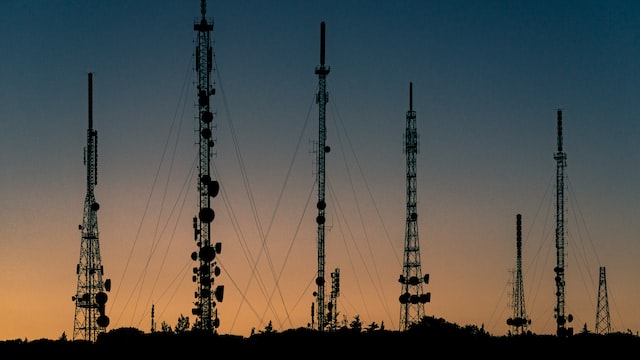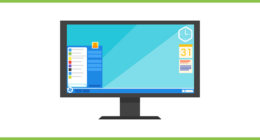Telecommunication refers specifically to the transmission of information over a distance through the use of electronic or optical signals, while ICT (Information and Communications Technology) encompasses a broader range of technologies and applications used to manage and communicate information, including hardware, software, and networking.
What is Telecommunication?
(Photo by Mario Caruso on Unsplash )

Telecommunication is the transmission of information over a distance through the use of electronic or optical signals. This can include sending and receiving messages, data, images, and voice or video communication through wired or wireless communication systems such as telephones, radio, television, and the internet. Telecommunication is an essential aspect of modern communication and allows individuals and organizations to connect and exchange information across the world.
What is ICT?
(Photo by Andrea Piacquadio: )

ICT (Information and Communications Technology) refers to a broad range of technologies and applications used to manage and communicate information. It includes hardware, software, and networking technologies that enable the collection, processing, storage, and dissemination of data and information. ICT encompasses a wide range of technologies, such as computers, the internet, mobile devices, software applications, social media platforms, and other digital tools and services that are used to create, process, store, and share information. The application of ICT has transformed various aspects of modern society, including business, education, healthcare, entertainment, and communication.
The difference between telecommunication and ICT
Telecommunication and ICT are related terms, but they have different meanings and scopes.
Telecommunication refers specifically to the transmission of information over a distance through the use of electronic or optical signals. It encompasses the physical and technological infrastructure that enables communication, such as wired and wireless networks, satellites, and fiber optic cables. Telecommunication is focused on the transmission of information and does not include the management or processing of information.
On the other hand, ICT encompasses a broader range of technologies and applications used to manage and communicate information. It includes hardware, software, and networking technologies that enable the collection, processing, storage, and dissemination of data and information. ICT covers not only the transmission of information but also the processing, storage, retrieval, and management of information.
ICT includes a wide range of technologies and applications such as computers, the internet, mobile devices, software applications, social media platforms, and other digital tools and services that are used to create, process, store, and share information. The focus of ICT is not limited to communication but includes the entire spectrum of activities involved in managing and utilizing information effectively.
In summary, while telecommunication is focused on the transmission of information, ICT covers a much broader range of activities and technologies involved in managing and utilizing information.
Advantages of ICT over Telecommunication
ICT (Information and Communications Technology) offers several advantages over telecommunication, including:
- Increased functionality: ICT offers a broader range of functions beyond telecommunication, such as data processing, storage, retrieval, and analysis. ICT also includes various software applications, databases, and other digital tools that enable individuals and organizations to perform complex tasks and streamline their operations.
- Improved efficiency: With ICT, communication and information management can be automated, reducing the need for manual intervention and increasing efficiency. For example, ICT can automate customer service, financial transactions, and inventory management, among other tasks.
- Greater flexibility: ICT offers greater flexibility in terms of the types of communication channels available, including email, social media, instant messaging, and video conferencing. This flexibility enables individuals and organizations to choose the most suitable communication channel for their needs and preferences.
- Enhanced collaboration: ICT provides various collaborative tools such as shared workspaces, project management software, and video conferencing that enhance collaboration among teams and stakeholders.
- Improved accessibility: ICT has improved accessibility to information and communication, especially for individuals and organizations in remote locations. With the internet and other digital tools, individuals and organizations can access information and communicate with others globally.
Telecommunication provides the basic infrastructure for communication, ICT offers a broader range of functions and tools that enable individuals and organizations to manage and utilize information more effectively, improving efficiency, collaboration, and accessibility.
Disadvantages of ICT over Telecommunication
While ICT (Information and Communications Technology) has several advantages over telecommunication, it also has some potential disadvantages, including:
- Technical Issues: ICT systems can be complex, and technical issues can arise, such as system failures, software bugs, and compatibility problems. These issues can cause significant downtime and can be costly to repair.
- Security Risks: With the increased use of digital communication and storage of information, there are also increased risks of cyber-attacks, data breaches, and other security threats. These security risks can be detrimental to organizations, leading to financial loss, reputation damage, and legal issues.
- Digital Divide: Not all individuals and communities have equal access to ICT infrastructure, which can lead to a digital divide. This can result in unequal opportunities for education, employment, and social participation.
- Overreliance on Technology: With the increased use of ICT, individuals and organizations may become over-reliant on technology, leading to a lack of critical thinking and problem-solving skills. This over-reliance can also lead to increased stress, burnout, and other negative effects on health and well-being.
- Cost: ICT systems can be expensive to purchase, implement, and maintain, especially for small businesses or low-income individuals. This can limit access to ICT infrastructure and tools.
While ICT has many advantages over telecommunication, it also has some potential disadvantages, including technical issues, security risks, the digital divide, over-reliance on technology, and cost.
What is the role of ICT in telecommunication?
ICT (Information and Communications Technology) plays a significant role in telecommunication by providing the necessary tools and infrastructure to facilitate communication and information exchange. Some of the ways in which ICT supports telecommunication include:
- Communication Infrastructure: ICT provides the necessary communication infrastructure, including cables, satellites, and wireless networks, that enable the transmission of voice, data, and video.
- Communication Devices: ICT has facilitated the development of various communication devices such as smartphones, tablets, laptops, and other wireless devices that allow people to communicate and access information on the go.
- Data Management: ICT supports telecommunication by providing tools for managing and analyzing data, such as big data analytics and data mining.
- Cloud Computing: ICT supports telecommunication by providing cloud-based services that enable people to access and share data and applications from anywhere in the world.
- Internet of Things (IoT): ICT has enabled the development of the Internet of Things (IoT), which allows devices to connect and exchange data without human intervention, thus improving the efficiency of telecommunication.
ICT plays a critical role in supporting telecommunication, providing the necessary tools, and infrastructure for communication and information exchange.
Is ICT used to handle telecommunications?
Yes, ICT is used to handle telecommunications. In fact, ICT stands for information and communication technology, so it includes all technologies that are used to handle information and communication. This includes everything from phone systems to the internet.
What are the two types of communication in ICT?
There are two types of communication in ICT: Digital and Analog.
Digital communication is the process of sending and receiving data in the form of digital signals. This type of communication is used for computer networks, television, radio, and telephone systems. Examples of digital communication devices include computers, modems, and routers.
Analog communication is the process of sending and receiving data in the form of analog signals. This type of communication is used for audio and video systems. Examples of analog communication devices include radios, telephones, and TVs.
What are the types of ICT
There are many types of ICT (Information and Communications Technology), which can be categorized into different areas, including:
- Communication Technologies: This includes tools and infrastructure that enable people to communicate and exchange information, such as mobile phones, email, video conferencing, and social media platforms.
- Networking Technologies: This includes the tools and infrastructure that allow devices to connect to each other and exchange data, such as Local Area Networks (LAN), Wide Area Networks (WAN), and the Internet.
- Information Management Technologies: This includes tools for managing and analyzing data, such as databases, data mining software, and Big Data analytics.
- Enterprise Software Applications: This includes software tools for managing various business processes, such as Customer Relationship Management (CRM), Enterprise Resource Planning (ERP), and Supply Chain Management (SCM).
- Education Technologies: This includes tools and infrastructure for learning and education, such as online learning platforms, e-books, and educational software.
- Entertainment Technologies: This includes technologies for entertainment and media consumption, such as gaming platforms, streaming services, and virtual reality.
- Cybersecurity Technologies: This includes tools and infrastructure for securing ICT systems and protecting against cyber threats, such as firewalls, antivirus software, and encryption tools.
These are just a few examples of the types of ICT available today, and the list continues to expand as technology advances and new tools and applications are developed.
What is the difference between IT and ICT?
IT (information technology) is a term that refers to all forms of technology used to create, store, exchange, and use information. It includes everything from computers and software to databases and security systems.
ICT (information and communications technology) is a term used to describe the intersection of computer and telecommunication technologies. ICT encompasses all forms of communication, including voice, data, image, and video.
What does an ICT engineer do?
An ICT engineer is responsible for the planning, design, implementation, and maintenance of an organization’s information and communications technology infrastructure. This includes the hardware, software, networking, and telecommunications systems that are used to support the organization’s operations.
The role of an ICT engineer can vary depending on the size and type of organization. In small organizations, ICT engineers may be responsible for all aspects of the organization’s ICT infrastructure. In larger organizations, ICT engineers may specialize in one or more areas, such as network engineering, software engineering, or telecommunications engineering.
ICT engineers typically have a bachelor’s degree in computer science or a related field. They may also have certification from a professional body such as the Institute of Electrical and Electronics Engineers (IEEE).
What does an telecommunication engineer do?
Telecommunication engineers are responsible for designing, installing, and maintaining telecommunications equipment and facilities. This can include telephone lines, fiber optic cables, microwave systems, and satellite networks. They may also work on VoIP (Voice over Internet Protocol) systems and wireless networks. In addition to their technical expertise, telecommunication engineers must be able to effectively communicate with other members of their team, as well as customers or clients.
Featured Image By – Photo by Jeevan Katel on Unsplash









